
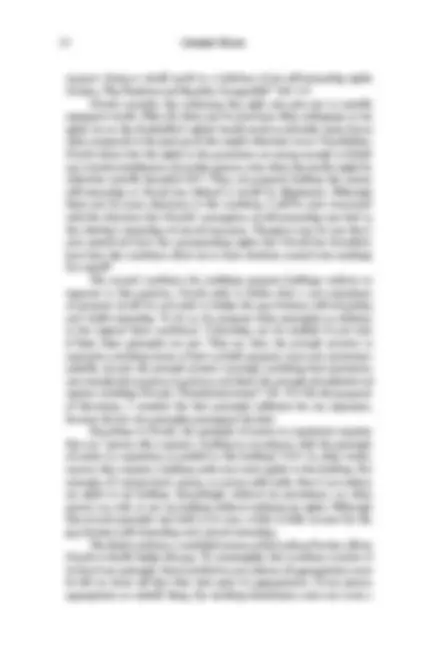
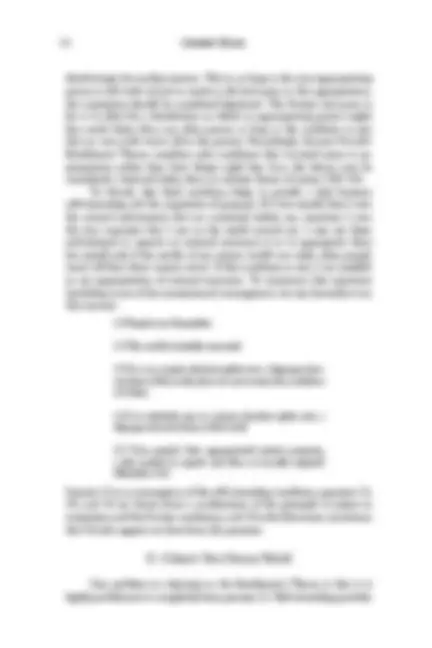
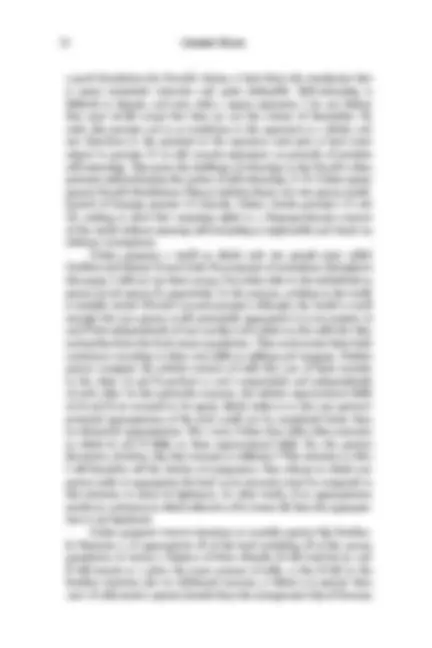
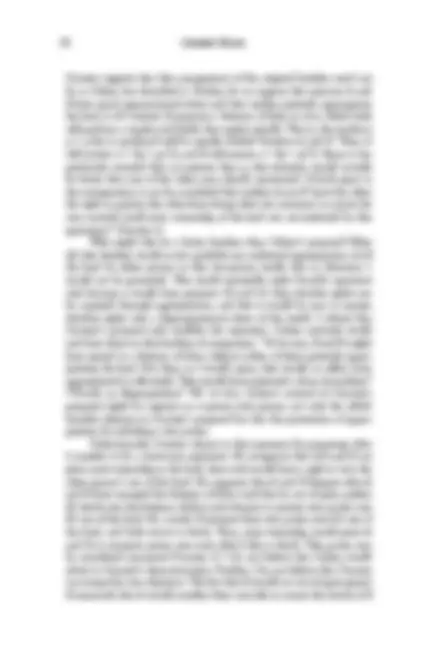
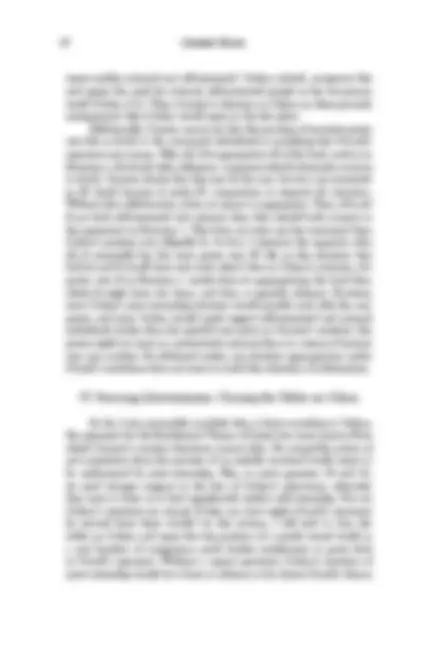
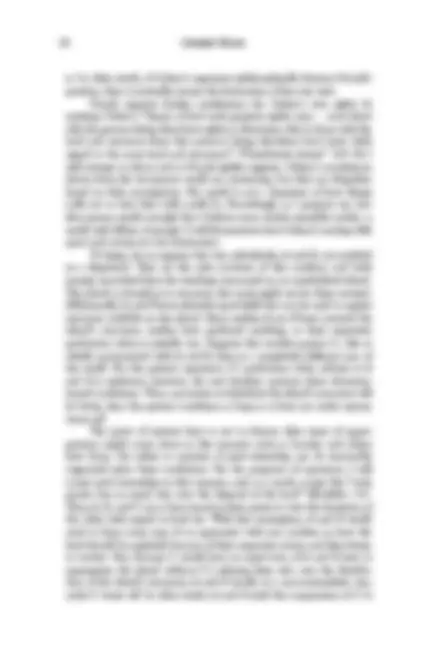


Study with the several resources on Docsity

Earn points by helping other students or get them with a premium plan


Prepare for your exams
Study with the several resources on Docsity

Earn points to download
Earn points by helping other students or get them with a premium plan
Community
Ask the community for help and clear up your study doubts
Discover the best universities in your country according to Docsity users
Free resources
Download our free guides on studying techniques, anxiety management strategies, and thesis advice from Docsity tutors
The philosophical debate between Robert Nozick's libertarian theory of distributive justice and G.A. Cohen's egalitarian objections. The author considers Cohen's criticism of Nozick's Entitlement Theory, specifically the argument of Matthew Ficker regarding arbitrariness in initial acquisition. The document also discusses David Conway's counter-objection and exposes a fundamental flaw in Cohen's position.
What you will learn
Typology: Study notes
1 / 12

This page cannot be seen from the preview
Don't miss anything!







Aporia vol. 24 no. 1 — 2014
Matthew F icker
hough several factors contributed to the eventual conclusion of the Cold War, one of the most influential causes was the notion of mutually assured destruction : the well - founded belief that if either the Soviet Union or the United States acted against the other, the result would be the annihilation of both nations. Because neither nation would risk this type of destruction, the so - called war was fuelled by psychological, political, and ideological tensions. Though the Cold War ended decades ago, and though the threat of nuclear conflict between the former Soviet Union and the United States has essentially dissolved, a different kind of war rages on today. In political philosophy, scholars continue to debate about the prin- ciples for which the war was fought—the principles of liberty and freedom on the one hand and the principles of justice and equality on the other. Among these scholars are Robert Nozick and G. A. Cohen, and each takes an opposing position in this philosophical battle. Nozick supports the libertarian notions of distributive justice, and Cohen supports the egalitarian view. In this paper, I will consider one of Cohen’s objections to Nozick’s Entitlement Theory of distributive justice, the argument of
Matthew Ficker is a senior majoring in philosophy with a minor in psychology at Brigham Young University. He is primarily interested in ethics. After graduating, he intends to pursue technical training in computer software and hardware development. This paper placed third in the 2014 David H. Yarn Philosophical Essay Contest.
arbitrariness in initial acquisition, and how this objection supposedly refutes the most fundamental premise of Nozick’s theory. I will argue that this criticism reveals some serious weaknesses in the Entitlement Theory that need to be strengthened in order to pose a satisfying libertarian account of distributive justice. However, I further argue that Cohen’s criticisms are not without problems of their own, and that they may assure the destruction of not only Nozick’s position but also his own. The argument in this paper will be outlined in four sections. In section one, I will provide a summary of the three main conditions that Nozick offers as the foundation for his theory. These include the requirement of self - ownership, the principle of justice in acquisition (the assumption that the world was initially un - owned), and the Nozickian version of the Lockean Proviso—that any acquisition must not result in someone being left worse off. In section two, I will consider G. A. Cohen’s two - person world example and consider how his and other objections seek to expose the arbitrariness of the Entitlement Theory, specifically in situations of initial acquisition. In section three, I will consider one counter - objection to these criticisms offered by David Conway and submit why I believe that his counter - objection fails to expose faults in Cohen’s position. Finally, in section four, I will expose a fundamental flaw in Cohen’s position, a flaw that leaves insufficient justification for his position of joint - ownership.
According to Nozick, at least three major conditions must be satisfied to justify property holding of any sort. First, the right to self - ownership must be maintained. As Nozick asserts at the outset of his book, “individuals have rights, and there are things which no individual or group can do to them (without violating these rights)” ( Anarchy, State, and Utopia ix). To support this claim, Nozick compares the moral rights that people have over themselves to the legal rights of a slaveholder over his slave. A slaveholder has legal property rights as possessor of his slave and, as such, has a right to utilize his slave as he sees fit so long as he does not harm another person in his actions. As a consequence of a slaveholder’s property rights, another person, regardless of circumstance, may not utilize the services of the slave without the consent of the slaveholder. Forcing the slave to dispose of his services without the slaveholder’s permission would result in a violation of the slaveholder’s rights. Analogously, my moral right to my body is equally restrictive. Any part of my body (my arm, for instance) is explicitly at my disposal. That is, I may use it in any manner that I see fit so long as I do not harm another person, and another person may not use my arm without my
disadvantage for another person. That is, as long as the non - appropriating person is left with at least as much as she had prior to the appropriation, the acquisition should be considered legitimate. The Proviso even goes so far as to allow for a distribution in which an appropriating person might fare much better than any other person as long as the condition is met that no one is left worse off in the process. Accordingly, because Nozick’s Entitlement Theory considers only conditions that occurred prior to ap- propriation rather than how things might have been , the theory may be considered a historical rather than an end - state theory of justice (203 – 04). To Nozick, this third condition helps to provide a link between self - ownership and the acquisition of property. If I own myself, then I own the natural endowments that are contained within me; moreover, I own the very capacities that I use on the world around me. I may use these endowments to operate on external resources so as to appropriate them for myself only if the results of my actions would not make other people worse off than their current status. If this condition is met, I am justified in my appropriation of external resources. To summarize this argument (including some of the unmentioned assumptions), we may formulate it in this manner:
(1) People own themselves.
(2) The world is initially unowned.
(3) You can acquire absolute rights over a disproportion- ate share of the world, if you do not worsen the condition of others.
(4) It is relatively easy to acquire absolute rights over a disproportionate share of the world.
(5) Once people have appropriated private property, a free market in capital and labor is morally required (Kymlicka 116).
Premise (1) is an assumption of the self - ownership condition; premises (2), (3), and (4) are drawn from a combination of the principle of justice in acquisition and the Proviso conditions, and (5) is the libertarian conclusion that Nozick suggests we draw from the premises.
One problem in objecting to the Entitlement Theory is that it is highly problematic to completely deny premise (1). Self - ownership provides
a good foundation for Nozick’s claims, at least from the standpoint that it seems intuitively attractive and quite defensible. Self - ownership is difficult to dispute, and even with a cogent argument, I do not believe that most would accept that they are not the owners of themselves. As such, this premise acts as an insulation to the argument as a whole, and any objections to the premises in the argument must give at least some respect to premise (1) or risk counter - arguments on grounds of intuitive self - ownership. This poses the challenge of objecting to the Nozick’s other premises without denying the notion of self - ownership. G. A. Cohen argues against Nozick’s Entitlement Theory with his theory of a two - person world. Instead of denying premise (1) directly, Cohen attacks premises (2) and (3), seeking to show that acquiring rights to a disproportionate amount of the world without rejecting self - ownership is implausible and based on arbitrary assumptions. Cohen proposes a world in which only two people exist, called Grabber and Johnny - Come - Lately. For purposes of consistency throughout this paper, I will not use these names, but rather refer to the individuals as person A and person B , respectively. In the scenario, nothing in the world is initially owned (Nozick’s second premise); although, the world is small enough that one person could potentially appropriate it in its entirety. A and B live independently of one another and subsist on the milk that they each gather from the local moose population. They each receive their daily sustenance according to their own skills in milking and trapping. Neither person compares the relative amount of milk that one of them receives to the other. A and B produce m and n respectively and independently of each other. In this particular scenario, the relative organizational skills of A and B are assumed to be equal, which makes it so that one person’s potential appropriation of the land could not be considered better than an alternative appropriation. (As a note, Cohen does offer other scenarios in which A and B differ in their organizational skills. For the present discussion, however, this first scenario is sufficient.) This situation is what I will hereafter call the baseline of comparison. Any scheme in which one person seeks to appropriate the land or its resources must be compared to this situation to assess its legitimacy. In other words, if an appropriation results in a situation in which either A or B is worse off, then the appropria- tion is not legitimate. Cohen proposes various situations to consider against this baseline. In Situation 1, A appropriates all of the land including all of the moose population_. A_ creates a division of labor whereby B will work for A, and B will receive as a salary the same amount of milk, n , that B did in the baseline situation plus an additional amount, p (where p is greater than zero). A will receive a greater benefit from the arrangement than B because
ultimate value, so important that it cannot be sacrificed for the other social ideals (e.g. equality of opportunity). He claims that a concern for people’s freedom to lead their own lives underlies his theory of unrestricted property rights. But his justification of the initial appro- priation of property treats [B’s] autonomy as irrelevant. (116 – 117) Cohen argues for a similar conclusion, asserting another form of arbitrariness inherent in Nozick’s argument that leads to illegitimate appro- priation. Cohen suggests that instead of accepting the originally unowned state of the world as postulated in premise (2), we should consider a baseline in which the world is jointly - owned. When compared to this new baseline, both A and B would have legitimate rights to all property, granting each the right to veto any appropriation. This proposition, of course, assumes that we should accept that non - materialistic conditions are important in our assessment appropriation situations. The argument from self - ownership seems to make this proposition a genuine possibility, as Kymlicka points out and as Nozick also seems to imply. Accordingly, accepting this joint - ownership would mean that any absolute appropria- tion would arbitrarily reject the veto power of one of the individuals and would make the non - appropriator worse off. If this veto power were indeed rejected, this would potentially deny people’s self - ownership rights because they would no longer be able to freely live according to their conception of the good (Cohen 420 – 21). Thus, Nozick’s theory seems to be arbitrary in that it only considers material elements in determining what constitutes a worsened condition, and it arbitrarily asserts an unowned world as part of the baseline of comparison when joint - ownership might be equally plausible. Given these objections, justified libertarianism may be threatened.
As Cohen’s argument stands, Nozick’s Entitlement Theory begins to lose its attractiveness. However, in a response to Cohen, David Conway acknowledges these arguments but does not consider them serious harms to Nozick’s position. On the contrary, Conway argues that the restriction of the original baseline to unheld things is not arbitrary and, thus, does not deny the principle of justice in acquisition. To argue his point, he proposes an alternative baseline of comparison. As already stated, Cohen objects to the original baseline of comparison where the world is initially unowned and where A and B work independently of one another to produce m and n , respectively. However,
Conway suggests that this arrangement of the original baseline need not be as Cohen has described it. Rather, let us suppose that persons A and B have equal organizational talent and that neither privately appropriates the land at all. Instead, B proposes a division of labor to A in which both will produce a surplus and divide the surplus equally. That is, the resultant p + q that is produced will be equally divided between A and B. Thus, A will receive m + [( p + q )/2], and B will receive n + [( p + q )/2]. Since it was previously assumed that q is greater than p , this situation would actually be better than any of the other ones already mentioned. If both agree to the arrangement, it can be concluded that neither A nor B “gave the other the right to prevent the other from doing what was necessary to ensure his own survival, [and] joint ownership of the land was not instituted by this agreement” (Conway 4). Why might this be a better baseline than Cohen’s proposal? After all, this baseline would in fact prohibit any unilateral appropriation of all the land by either person in this two - person world; that is, Situation 1 would not be permitted. This would essentially make Nozick’s argument void because it would deny premises (3) and (4) — that absolute rights can be acquired through appropriation, and that it would be easy to acquire absolute rights over a disproportionate share of the world. I submit that Conway’s proposal only muddles the argument. Cohen certainly would and does object to this baseline of comparison: “To be sure, A and B might have agreed to a division of labor without either of them privately appro- priating the land. But then, so I would argue, they would, in effect, have appropriated it collectively. They would have instituted a form of socialism” (“Nozick on Appropriation” 98). In fact, Cohen’s reversal of Conway’s proposal might be superior as it grants each person not only the added benefits inherent in Conway’s proposal but also the prevention of appro- priation by including a veto power. Unfortunately, Conway objects to this argument by proposing what I consider to be a straw - man argument. He recognizes that if A and B are given joint - ownership to the land, then each would have a right to veto the other person’s use of the land. He supposes that A and B disagree after A and B have arranged the division of labor such that A , out of spite, prefers B ’s death over the division of labor and chooses to exercise veto power over B ’s use of the land. As a result, B exercises their veto power over A ’s use of the land, and both starve to death. Thus, joint - ownership would grant A and B an excessive power over each other’s life or death. This power may be considered tyrannical (Conway 4). I do not believe that Cohen would admit to Conway’s characterization. Further, I do not believe that Conway can escape his own objection. The fact that A would act out of spite against B insomuch that A would sacrifice their own life to ensure the death of B
is. In other words, if Cohen’s argument philosophically destroys Nozick’s position, then it mutually assures the destruction of his own view. Nozick requests further justification for Cohen’s veto rights by insisting Cohen’s “theory of how such property rights arise... must show why the persons living there have rights to determine what is done with the land and resources there that person’s living elsewhere don’t have (with regard to the same land and resources)” (“Distributive Justice” 213). As I will attempt to show, and as Nozick rightly suggests, Cohen’s conclusions drawn from the two - person world are convincing, but they are altogether based on false assumptions. His world is not a depiction of how things really are or how they really could be. Accordingly, as I propose my own three - person world example that I believe more closely resembles reality — a world with billions of people — I will demonstrate how Cohen’s analogy falls apart and assures its own destruction. To begin, let us suppose that two individuals, A and B , are involved in a shipwreck. They are the only survivors of this accident, and both emerge unscathed from the wreckage marooned on an uninhabited island. The island is abundant in resources that each might use for their survival. Additionally, A and B have relatively equal skills that can be used to exploit resources available on the island. Since neither A nor B have accessed the island’s resources, neither have produced anything, so their respective production value is initially zero. Suppose that another person C , who is wholly unconnected with A and B , lives in a completely different area of the world. For the present argument , C’s production value relative to A and B is irrelevant; however, the new baseline contains these aforemen- tioned conditions. Thus, any system to distribute the island’s resources will be better than the present condition as long as it does not make anyone worse - off. The point of interest here is not to discuss what types of appro- priation might come about in this scenario such as Conway and others have done, but rather to examine if joint - ownership can be reasonably supported given these conditions. For the purposes of argument, I will accept joint - ownership in this scenario, and, as a result, accept that “each person has an equal veto over the disposal of the land” (Kymlicka 121). Thus, A , B , and C are at least equal in their power to veto the decisions of the other with regard to land - use. With this assumption, A and B would need to form some type of an agreement with one another on how the land should be exploited because of their respective vetoes and their desire to survive. But, because C would have an equal veto, if A and B were to appropriate the island without C ’s relaxing their veto over the distribu- tion of the island’s resources, A and B would, in a non - materialistic way, make C worse off. In other words, A and B need the cooperation of C to
legitimately access the resources of the island. Without C ’s relaxing their veto power, A and B are not justified in improving their condition. C ’s veto in this situation could simply be ignored on the basis that A and B’s ap- propriation does not necessarily concern him or her (that is, her situation would really not be worsened), but that seems arbitrarily justified and, in fact, would not be consistent with the objections offered against Nozick in section two. If it is unreasonable to require equal consideration of everyone’s veto, and if we can consequently ignore C ’s ability to veto in this situation, why can we not ignore the notion of joint - ownership altogether or at least the joint - ownership between A and B in Cohen’s two - person world? For the sake of brevity, I will not attempt to answer this question here but leave it open for others to address. Suffice it to say that, unless Cohen can provide justification for joint - ownership and the presumed veto power that comes with it, then his theory seems just as arbitrary as he claims Nozick’s is.
In conclusion, Cohen’s arguments against the Entitlement Theory ironically face a similar mutually assured destruction problem that dominated the tensions of the Cold War. Though Cohen does not rely on military force, his philosophical weapon — the argument of arbitrariness — acts as a strong preemptive strike against opposing libertarian assumptions. However, Cohen’s intellectual offensive seems to backfire: Inasmuch as it proves fatal to the intended target, his argument also seems to yield fatal results for the foundations of his own theory. Though I do not here conclude that joint - ownership must be ruled out or that it cannot be justified, I simply echo Nozick’s request for further validation. In fact, should a plausible argument appear, I would suggest that Cohen’s argument might be considered successful in disproving Nozick’s Entitlement Theory of distributive justice. Nevertheless, unless such an argument appears on either side, the philosophical battle may continue endlessly.